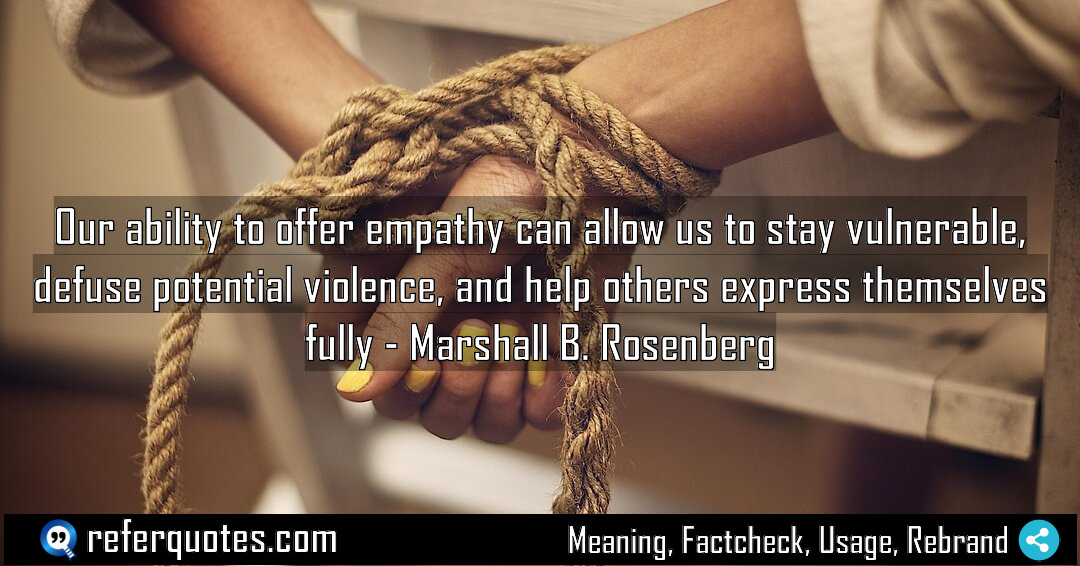
Our ability to offer empathy can allow us to stay vulnerable… it sounds simple, but this is the secret sauce to defusing conflict and creating real connection. It’s about disarming others by first disarming yourself.
Share Image Quote:
Table of Contents
Meaning
At its heart, this quote means that empathy isn’t just something we do for others; it’s a tool that protects our own humanity and creates a space where real, honest communication can finally happen.
Explanation
Let me break this down from my own experience. When Rosenberg talks about empathy allowing us to stay vulnerable, he’s flipping the script on how we usually think about strength. We think we need thick skin, right? But true strength is staying open even when every fiber of your being wants to shut down or attack. That vulnerability is a signal to the other person that you’re not a threat.
And that’s how it defuses violence—and I’m talking everything from a shouting match to silent resentment. You’re literally de-escalating the situation by refusing to meet their energy with more of the same. You become a non-anxious presence.
Finally, by holding that space, you help others express themselves fully. When people feel truly heard, they don’t need to scream. They can finally get to the real pain or the real need underneath all the anger. It’s like magic, but it’s a practiced, difficult, and incredibly rewarding skill.
Quote Summary
Reading Level80
Aesthetic Score80
Origin & Factcheck
This is straight from Marshall B. Rosenberg’s seminal work, Nonviolent Communication: A Language of Life. The book first came out in the United States back in 1999, and this concept is the absolute bedrock of his entire NVC model. You sometimes see similar sentiments about empathy floating around, but this specific phrasing and the profound connection between empathy and vulnerability is pure Rosenberg.
Attribution Summary
Where is this quotation located?
| Quotation | Our ability to offer empathy can allow us to stay vulnerable, defuse potential violence, and help others express themselves fully |
| Book Details | Publication Year: 1999; ISBN: 9781892005038; Last edition: 3rd Edition (2015); Number of pages: 264. |
| Where is it? | Chapter 8: The Power of Empathy, Page 134 (2015 edition) |
Context
In the book, this isn’t just a nice idea tucked away in a chapter. This is the operating principle. Rosenberg developed NVC after working in deeply divided communities, and he saw that the only way to break cycles of conflict was to introduce this exact skill. It’s presented as a practical alternative to our default language of judgment and blame.
Usage Examples
So, where do you actually use this? Everywhere.
Think about a manager dealing with a frustrated team member. Instead of getting defensive about a missed deadline, the manager uses empathy: “It sounds like you’re completely overwhelmed and worried about the quality of your work. Is that right?” That vulnerability defuses the employee’s defensiveness and allows the real issue—maybe a resource problem—to surface.
Or in a personal relationship. Your partner snaps at you. The old you snaps back. The NVC-you takes a breath and says, “Are you feeling stressed because you need some support right now?” You stay vulnerable by not retaliating, which helps them express the stress they’re under instead of just arguing about the snapping.
It’s for anyone in a position of communication—which is everyone. Leaders, parents, teachers, partners. It’s the ultimate tool for transforming conversations.
To whom it appeals?
Share This Quote Image & Motivate
Motivation Score85
Popularity Score85
Shareability Score80
Common Questions
Question: Doesn’t staying vulnerable just make you a doormat?
Answer: This is the biggest misconception. It’s not about being passive. It’s about being centered. You’re choosing to be vulnerable from a place of strength and self-awareness, not weakness. You’re setting a boundary with your energy, not your words.
Question: How do you offer empathy when you’re also angry?
Answer: You have to give it to yourself first. Seriously. Before you can listen to them, you have to acknowledge your own feelings and needs. A quick internal, “I’m feeling furious because I need respect right now,” can create just enough space to then turn your attention to them.
Question: Is this really practical in a high-stakes business negotiation?
Answer: It’s especially practical there. When the other side is being aggressive, your empathetic, non-reactive presence throws them off their game. It allows you to uncover their underlying interests, which is where real deals are made, not in a battle of positional demands.
Similar Quotes
When we stay with empathy, we allow others to fully express themselves. It’s a game-changer because it removes the fear of judgment. This simple shift transforms how we connect with…
Empathy is a respectful understanding is one of those concepts that seems simple until you try to actually do it. It’s not about fixing problems or agreeing, but about truly…
When we give ourselves empathy, we allow our true self to emerge. It’s about creating a safe space internally, so your authentic self can finally show up without fear or…
When we are in pain, empathy is what helps us reconnect to life. It’s a simple but profound truth about how we heal from emotional hurt. This isn’t about fixing…
You know, “A prerequisite to empathy is simply paying attention” is such a powerful truth. It cuts through all the complexity and reminds us that real connection starts with a…
